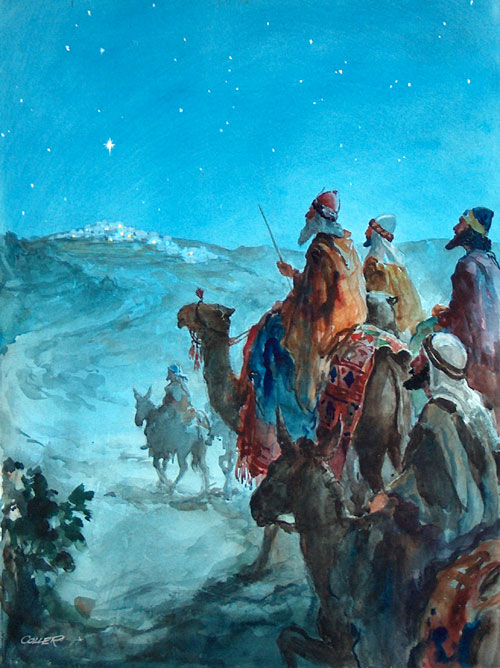
Gold, Frankincense and Myrrh; most everyone associates this trio of gifts with Christmas and the Wise Men’s visit, but few have given much thought to the gifts themselves. Why did they bring these particular gifts? Gold is perhaps understandable because it is widely used and recognized for it’s value and beauty, but what about the other two? Other than their Christmas connotation, we rarely, if ever, hear anything about them. So, why were these chosen above everything else of value? If the Wise Men were truly wise, and I’m sure they were, they could have picked from anything the world had to offer. This is worth a closer look.
The journey of the Wise Men, or Magi, as some translations refer to them, was not an easy one. The Bible book of Matthew states that they came ‘from the east.’ Because of the Old Testament book of Daniel’s reference to Chaldeans (astrologers) and wise men, and the fact that Daniel, himself, was appointed by the King to be the chief over all the wise men of Babylon, it is thought by many that the Christmas Magi came from Babylon, which is present-day Iran. Babylon to Bethlehem would be about a 1,000 mile journey, which would take at least several months. If they came from farther east, it would have taken much longer. If you don’t know by now, Matthew mentions three gifts were delivered, but does not say how many Wise Men delivered them. This was probably not just three travelers who stopped in Jerusalem to ask King Herod for directions (wise men will do this.) Some scholars think there may have been as many as 60 in the entourage that traveled by camel to Jerusalem. No wonder the King ‘was troubled, and all Jerusalem with him.’
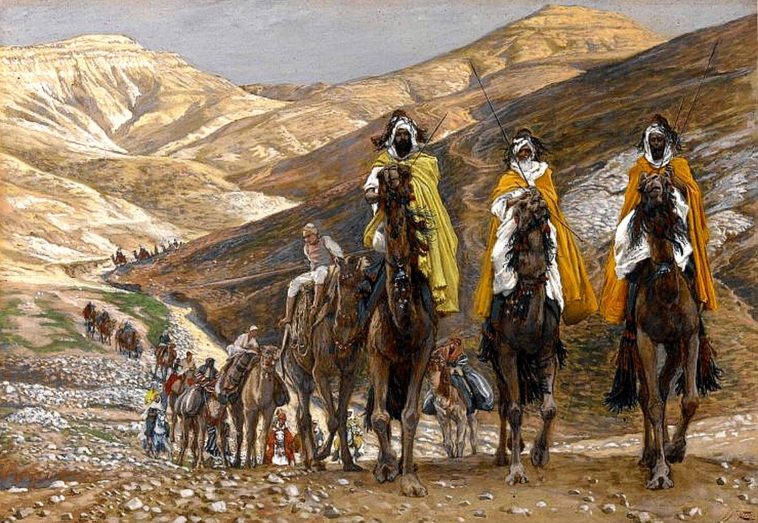
Their journey would not have been an easy one. They would have studied, planned and made many preparations for quite some time before such an undertaking could get underway. Travel wasn’t easy back then and they had to bring food, tents and a whole lot more. This trip cost the Magi money, time and comfort, and they weren’t even sure where they were going. In making a trip such as this, they must have put considerable thought into what gifts to bring. They probably had a thought such as this; “If we are going to all this effort, the gifts we bring had better be perfect for the King of the Jews.”
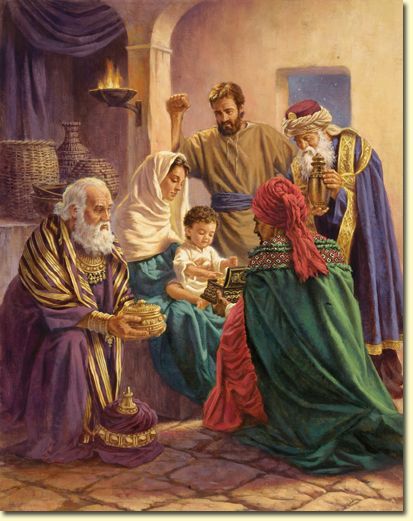
“And they came into the house and saw the Child with Mary His mother; and they fell down and worshiped Him; and opening their treasures they presented to Him gifts of gold and frankincense and myrrh.” Matt. 2:11
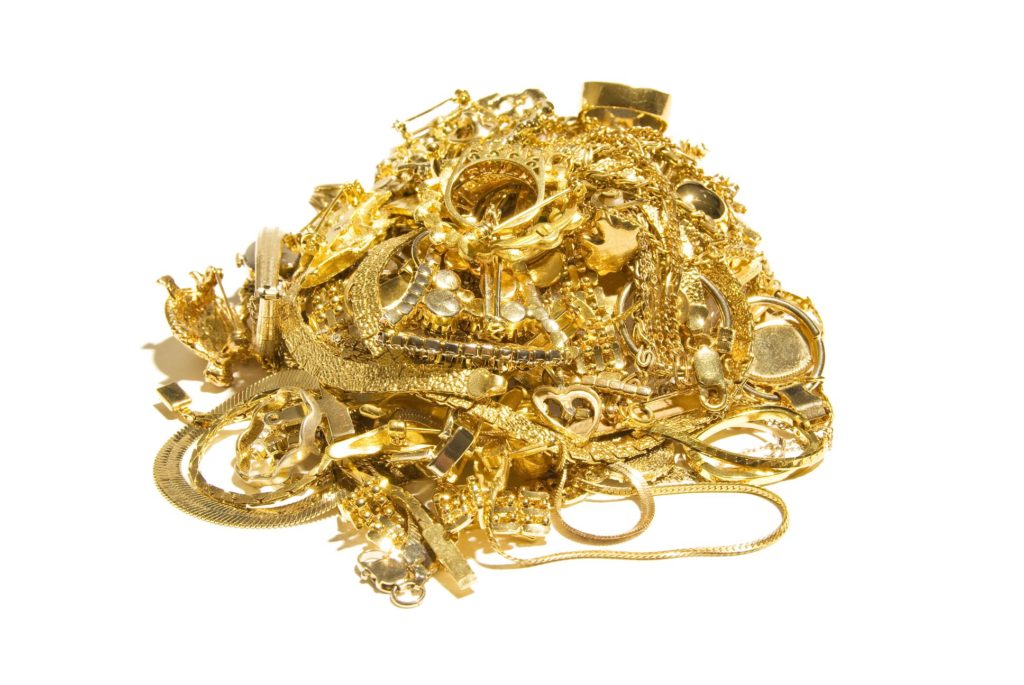
Gold is the gift of royalty and wealth; the gift for kings. Gold has always had great value and importance. Genesis 13:2 tells us, ‘Now Abraham was very rich in livestock, in silver and in gold.’ Pharaoh, King of Egypt promoted Joseph to rule over Egypt and ‘put the gold necklace around his neck.’ Gen 41:42. In Exodus 25:10, we read about God’s instructions for making items in the Tabernacle; ‘construct an ark…and overlay it with pure gold, inside and out.’ The table of showbread, the lampstand and all the other utensils were also made of pure gold. And when King Solomon built the Temple, he ‘overlaid the whole house with gold.’ I Kings 6:22. The King of Babylon gave a banquet in Esther 1:7 in which ‘drinks were served in golden vessels.’ The book of Revelation tells us about ‘the Son of Man having a golden crown on His head,’ and ‘the holy city was pure gold, like clear glass and the streets of the city were pure gold.’
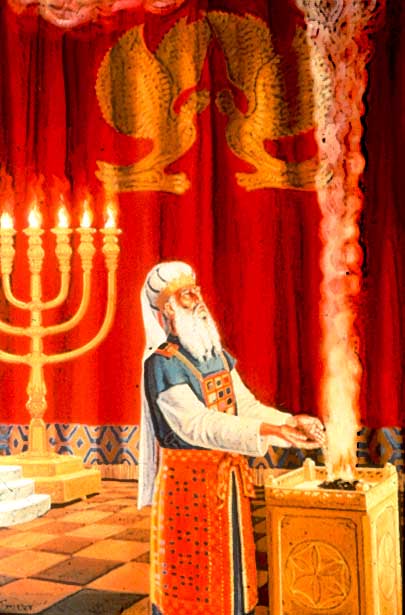
Frankincense was the gift of worship and it was at that time, also of great value, being ‘worth it’s weight in gold.’ Frankincense comes from the Boswellia tree. The bark of the tree is peeled back and a cut is made with a knife. A sap-like gum extrudes from the wound and in time, dries and hardens into golden nuggets of resin before being removed. According to Exodus 30, God told Moses how to take spices and pure frankincense and beat them into a very fine, powdered incense to be burned on the golden altar of incense in the Tabernacle. Frankincense is mentioned several times in the book of Leviticus when being used as, ‘an offering by fire of a soothing aroma to the Lord.’
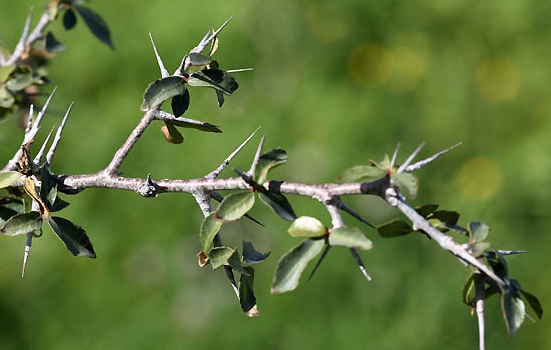
The third gift, myrrh, was the gift of suffering. In addition to having a pleasing aroma, myrrh is medicinal and soothing to the skin. Psalm 45:8 states, ‘all the Kings garments are fragrant with myrrh and aloes and cassia’ (cinnamon). When Esther and the other women were preparing to go before the King of Babylon, it was used ‘for the women – for the days of their beautification were as follows, six months with the oil of myrrh…’ Esther 2:12. As a medicine, it was customary for the Romans to give myrrh to those being crucified, to ease their pain. We read in Mark 15:23, ‘And they tried to give Jesus wine mixed with myrrh, but He did not take it.’ Myrrh was also used to prepare bodies for burial as we see in John 19. ‘And Nicodemus came…bringing a mixture of myrrh and aloes, about a hundred pounds weight. And so they took the body of Jesus and bound it in linen wrappings with the spices.’ Myrrh is an unattractive plant, the root word of which is “marar”, meaning ‘bitterness.’ It is a scrubby, thorny, stiff-branched shrub, which reminds me of Isaiah 53:2, ‘He (Jesus) has no stately form or majesty that we should look upon Him nor appearance that we should be attracted to Him.’ Myrrh, similar to frankincense, is a gum resin that is taken from the plant by making a cut in the bark. It then bleeds drops of white sap that turn a reddish-brown color as it mixes with the air, much like human blood does. If you take a close look at the plant, you will notice the sharp thorns on the branches. It is my personal opinion that the crown of thorns fashioned by the Romans for Jesus was made from the myrrh branches.

So, what gifts can we give the King?
Gold represented royalty and is very valuable. Our own lives are very valuable to God no matter if we are rich or poor. ‘For you have been bought with a price: therefore glorify God in your body.’ I Cor. 6:20 We can give our lives to God through Jesus, His Son. John 3:3, ‘Jesus answered and said to Nicodemus, “Truly, truly I say to you , unless one is born again, he cannot see the kingdom of God.”‘ ‘For God delivered us from darkness, and transferred us to the kingdom of His beloved Son, in whom we have redemption, the forgiveness of sins.’ Col. 1:13. ‘The Spirit Himself bears witness with our spirit that we are children of God, and if children, heirs also, heirs of God and fellow-heirs with Christ…’ This is royalty!
Frankincense represented worship. We certainly can worship God and are commanded to do so. ‘Come, let us worship and bow down; Let us kneel before the Lord our Maker, For He is our God.’ Psalm 95:6. ‘But an hour is coming and now is, when the true worshipers shall worship the Father in spirit and truth: for such people the Father seeks to be His worshipers.‘ John 4:23-24.
Myrrh represented suffering. We can suffer for the cause of Jesus. ‘Blessed are those who have been persecuted for the sake of righteousness, for theirs is the kingdom of heaven. Blessed are you when men revile you and persecute you and say all kinds of evil against you falsely on account of Me(Jesus). Rejoice and be glad for your reward in heaven is great.’ Matt. 5:10-12. ‘If anyone suffers as a Christian, let him not feel ashamed, but in that name let him glorify God.’ I Peter 4:16. ‘For I consider that the sufferings of this present time are not worthy to be compared with the glory that is to be revealed to us.’ Rom. 8:18.
Now you know why these three gifts were brought to Jesus:
Gold for our King of Kings
Frankincense for our High Priest
Myrrh for our Savior